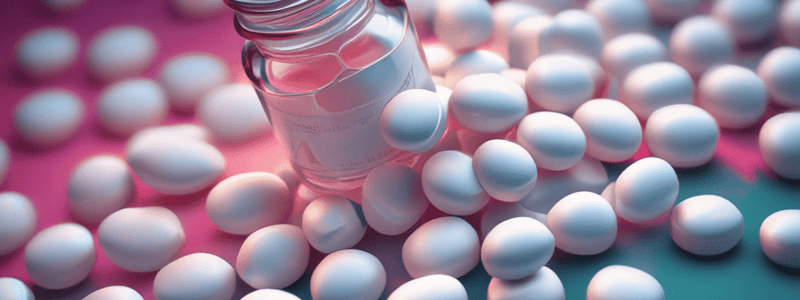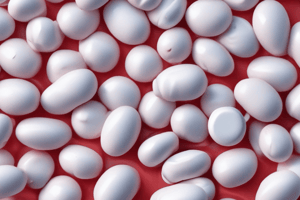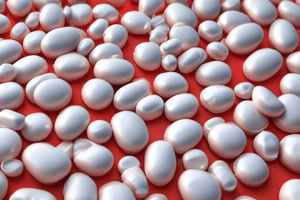Podcast
Questions and Answers
What is the generic name for Aspirin?
What is the generic name for Aspirin?
- Acetylsalicylic Acid (correct)
- Nitrodur
- Tridil
- Nitroglycerin
Which of the following is a contraindication for Aspirin?
Which of the following is a contraindication for Aspirin?
- Angina
- Chest pain
- Fever
- Active bleeding (correct)
What is the mechanism of action for Aspirin?
What is the mechanism of action for Aspirin?
- Increases subendocardial blood flow
- Vascular smooth muscle relaxation
- Decreases preload and reduces myocardial oxygen demand
- Blocks the formation of thromboxane A and inhibits platelet aggregation (correct)
What is the first-line agent for treating pulmonary edema from congestive heart failure?
What is the first-line agent for treating pulmonary edema from congestive heart failure?
What is the recommended dosage of Nitroglycerin for an adult with chest pain?
What is the recommended dosage of Nitroglycerin for an adult with chest pain?
Which of the following is a contraindication for Nitroglycerin?
Which of the following is a contraindication for Nitroglycerin?
What is the mechanism of action for Nitroglycerin?
What is the mechanism of action for Nitroglycerin?
What is the recommended dosage of Nitroglycerin for an adult with pulmonary edema from congestive heart failure?
What is the recommended dosage of Nitroglycerin for an adult with pulmonary edema from congestive heart failure?
What is the recommended dosage of Aspirin for an adult with chest pain, myocardial infarction, or unstable angina?
What is the recommended dosage of Aspirin for an adult with chest pain, myocardial infarction, or unstable angina?
What is the recommended dosage of Nitroglycerin for a pediatric patient?
What is the recommended dosage of Nitroglycerin for a pediatric patient?
What is the generic name for Pressin?
What is the generic name for Pressin?
Which of the following is NOT a contraindication or caution for atropine?
Which of the following is NOT a contraindication or caution for atropine?
What is the maximum adult dose of atropine for cardiac indications?
What is the maximum adult dose of atropine for cardiac indications?
Which of the following is NOT a serious adverse reaction of vasopressin?
Which of the following is NOT a serious adverse reaction of vasopressin?
What is the pediatric dose of atropine for organophosphate poisoning in children under 12 years old?
What is the pediatric dose of atropine for organophosphate poisoning in children under 12 years old?
What is the indication for vasopressin according to the ACLS algorithm?
What is the indication for vasopressin according to the ACLS algorithm?
Which of the following is NOT a mechanism of action for atropine?
Which of the following is NOT a mechanism of action for atropine?
What is the adult dosage of vasopressin?
What is the adult dosage of vasopressin?
Which of the following is NOT a common adverse reaction of vasopressin?
Which of the following is NOT a common adverse reaction of vasopressin?
What is the minimum dose of atropine for pediatric cardiac indications?
What is the minimum dose of atropine for pediatric cardiac indications?
Which of the following is a serious adverse reaction of Aspirin (Acetylsalicylic Acid)?
Which of the following is a serious adverse reaction of Aspirin (Acetylsalicylic Acid)?
What is the mechanism of action of Nitroglycerin?
What is the mechanism of action of Nitroglycerin?
Which of the following is a contraindication for Aspirin (Acetylsalicylic Acid)?
Which of the following is a contraindication for Aspirin (Acetylsalicylic Acid)?
What is the recommended adult dosage of Nitroglycerin for chest pain or angina?
What is the recommended adult dosage of Nitroglycerin for chest pain or angina?
Which of the following is a contraindication for Nitroglycerin?
Which of the following is a contraindication for Nitroglycerin?
What is the recommended adult dosage of Aspirin (Acetylsalicylic Acid) for chest pain, myocardial infarction, or unstable angina?
What is the recommended adult dosage of Aspirin (Acetylsalicylic Acid) for chest pain, myocardial infarction, or unstable angina?
Which of the following is a serious adverse reaction of Nitroglycerin?
Which of the following is a serious adverse reaction of Nitroglycerin?
What is the generic name for Nitrostat, Nitrospan, Nitrodisc, Nitrodur, and Tridil?
What is the generic name for Nitrostat, Nitrospan, Nitrodisc, Nitrodur, and Tridil?
Which of the following is a less serious adverse reaction of Aspirin (Acetylsalicylic Acid)?
Which of the following is a less serious adverse reaction of Aspirin (Acetylsalicylic Acid)?
What is the classification of Nitroglycerin?
What is the classification of Nitroglycerin?
Which of the following is NOT a consideration for the use of vasopressin?
Which of the following is NOT a consideration for the use of vasopressin?
Which of the following is a serious adverse reaction associated with vasopressin?
Which of the following is a serious adverse reaction associated with vasopressin?
What is the mechanism of action for vasopressin?
What is the mechanism of action for vasopressin?
Which of the following is a contraindication for the use of atropine?
Which of the following is a contraindication for the use of atropine?
What is the mechanism of action for atropine?
What is the mechanism of action for atropine?
Which of the following is NOT an indication for atropine?
Which of the following is NOT an indication for atropine?
What is the maximum adult dose of atropine for cardiac indications?
What is the maximum adult dose of atropine for cardiac indications?
Which of the following is a common adverse reaction of atropine?
Which of the following is a common adverse reaction of atropine?
What is the minimum dose of atropine for pediatric cardiac indications?
What is the minimum dose of atropine for pediatric cardiac indications?
Which of the following is a consideration for the use of atropine?
Which of the following is a consideration for the use of atropine?
What is the primary classification of Aspirin (Acetylsalicylic Acid)?
What is the primary classification of Aspirin (Acetylsalicylic Acid)?
Which of the following best describes the indication for Nitroglycerin?
Which of the following best describes the indication for Nitroglycerin?
What is a common adverse reaction associated with Aspirin (Acetylsalicylic Acid)?
What is a common adverse reaction associated with Aspirin (Acetylsalicylic Acid)?
Which of the following is a serious adverse reaction to Nitroglycerin?
Which of the following is a serious adverse reaction to Nitroglycerin?
What action does Aspirin (Acetylsalicylic Acid) have on platelets?
What action does Aspirin (Acetylsalicylic Acid) have on platelets?
Which condition is Aspirin (Acetylsalicylic Acid) relatively contraindicated with?
Which condition is Aspirin (Acetylsalicylic Acid) relatively contraindicated with?
What is the primary action mechanism of Nitroglycerin?
What is the primary action mechanism of Nitroglycerin?
Which of the following is a less serious adverse reaction to Nitroglycerin?
Which of the following is a less serious adverse reaction to Nitroglycerin?
What is a common adverse reaction associated with Nitroglycerin?
What is a common adverse reaction associated with Nitroglycerin?
What is the mechanism of action for vasopressin that causes uterine contractions in large doses?
What is the mechanism of action for vasopressin that causes uterine contractions in large doses?
Which of the following is a serious adverse reaction associated with atropine administration?
Which of the following is a serious adverse reaction associated with atropine administration?
What is the recommended maximum adult dose of atropine for cardiac indications?
What is the recommended maximum adult dose of atropine for cardiac indications?
Which of the following is a contraindication for the use of atropine?
Which of the following is a contraindication for the use of atropine?
Which of the following is NOT a mechanism of action for atropine?
Which of the following is NOT a mechanism of action for atropine?
What is the recommended adult dosage of vasopressin according to the ACLS algorithm for ventricular fibrillation?
What is the recommended adult dosage of vasopressin according to the ACLS algorithm for ventricular fibrillation?
Which of the following is a common adverse reaction associated with vasopressin administration?
Which of the following is a common adverse reaction associated with vasopressin administration?
Which of the following is a contraindication or caution for the use of atropine?
Which of the following is a contraindication or caution for the use of atropine?
What is the mechanism of action for atropine that causes relaxation of smooth muscle in the bronchial tree?
What is the mechanism of action for atropine that causes relaxation of smooth muscle in the bronchial tree?
Which of the following is a serious adverse reaction associated with vasopressin administration?
Which of the following is a serious adverse reaction associated with vasopressin administration?
Flashcards are hidden until you start studying
Study Notes
-
Vasopressin:
- Trade Name: Pressin
- Generic Name: Vasopressin
- Classification: Vasopressor, similar to catecholamine
- Indication: Alternative to epinephrine in ACLS algorithm for Ventricular fib
- Dosage: Adult 40 units IV Push single dose only
- Action Mechanism: Natural hormone - ADH released from pituitary, non-adrenergic peripheral vasoconstrictor, increases water absorption in renal tubules, causes uterine contractions
- Adverse Reactions: Serious - MI, bradycardia, angina; Common - abdominal cramps, N/V, tremors, headache
-
Atropine:
- Trade Name: Atropine
- Generic Name: Atropine
- Classification: Anticholinergic
- Indication: Hemodynamically compromised symptomatic bradycardia (non-AMI), other specific conditions
- Dosage: Adult 1.0 mg rapid IVP q 3-5 min up to max 3 mg or 0.04 mg/kg
- Action Mechanism: Parasympatholytic, increases myocardial oxygen demand, relaxes smooth muscle in GI tract, causes bronchial relaxation
- Adverse Reactions: Serious - paradoxical bradycardia if given too slowly or below minimum dose, dry mouth, blurred vision, tachycardia
-
Aspirin:
- Trade Name: Aspirin
- Generic Name: Acetylsalicylic Acid
- Classification: Antiplatelet, non-narcotic analgesic, antipyretic
- Indication: Cardiac chest pain, angina, AMI, fever, inflammation
- Dosage: Adult 162-324 mg PO for chest pain/MI/unstable angina
- Action Mechanism: Blocks thromboxane A formation, inhibits platelet aggregation
- Adverse Reactions: Serious - GI bleeding, anaphylaxis; Common - nausea, vomiting, rash
-
Nitroglycerin:
- Trade Names: Nitrostat, Nitrospan, Nitrodisc, Nitrodur, Tridil
- Generic Name: Nitroglycerin
- Classification: Nitrate, Vasodilator
- Indication: Chest Pain/Angina, MI, pulmonary edema from CHF
- Dosage: Adult 0.4mg SL spray or tablet q. 3-5 minutes; IV drip at 10-20 mcg/min
- Action Mechanism: Vascular smooth muscle relaxation, decreases preload and myocardial O2 demand, coronary artery dilation
- Adverse Reactions: Serious - hypotension, bradycardia; Common - headache, lightheadedness
Studying That Suits You
Use AI to generate personalized quizzes and flashcards to suit your learning preferences.




